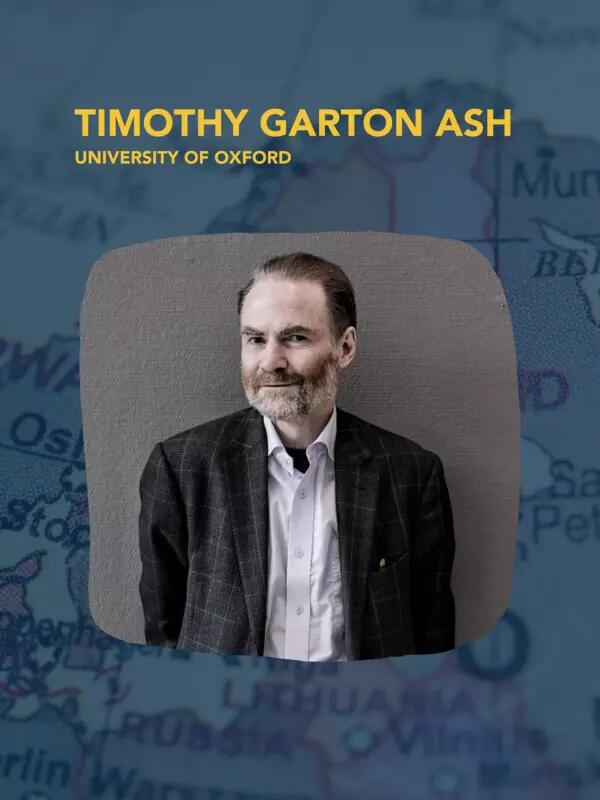
Timothy Garton Ash: 'From Post-War Europe to Post-Wall Europe - and Back'
Fifty years of travel through Europe naturally yields a wealth of insights. In his new book Homelands—A Personal History of Europe, a celebrated historian Timothy Garton Ash tracks the major moments of European history since 1945 using his own notes and recollections. From meeting some of the region’s most prominent figures—in some cases long before they rose to power —and bearing witness to events that rocked the world and would eventually be considered critical turning points, Garton Ash certainly has rich experiences to draw on. On September 18, 2023, he shared the insights gained from them in a lecture hosted by CERES.
Rather than delivering a traditional book talk (indicative of the fact that Homelands itself is not a traditional history of Europe), Garton Ash invited the audience to reflect on the ways in which we understand European history since the end of the World War II. He offered new or revised frameworks for analyzing events after 1945 not just on the continent, but across the world. Far from the idea of “post-war” that is so often used to describe the subsequent period, Garton Ash argues that there has been hardly an absence of war and conflict at all, as violence continued behind the Iron Curtain and elsewhere in the pursuit of the process of decolonization. Eastern Europe, he asserted, only saw the end of the war in 1989, after the fall of the Berlin Wall, which ushered in what Garton Ash coins “post-Wall” Europe. It is in this context, he describes, that Europe set out to be a continent without war and without walls, “a Europe whole and free, a Europe moving towards perpetual peace.”
Garton Ash starkly contrasted that ideal with today, when war is a current and horrifying reality in Europe. At the outset of his book project five years earlier, Garton Ash sought to illustrate to readers, specifically young Europeans, the precarity of what Europe could devolve into should we not recognize the mistakes of the past or remain conscious about the decisions of the present. At that time, he spoke to the surviving veterans of the World War II who could attest to how grim and even hellish Europe could become. Now, he shows, the historical narrative is not needed to illustrate this, as we witness before our eyes in Ukraine the horrific result of the hubris of “post-Wall" Europe—the concept of which he believes led to Russia’s full-scale invasion of Ukraine.
But how did Europe arrive at this point? For Garton Ash, the critical year was 2008, when the global financial crisis began to take hold, and Russia’s President Vladimir Putin invaded Georgia’s regions of South Ossetia and Abkhazia. As economic and social issues plagued Europe and leaders on the continent (Garton Ash named Hungarian Prime Minister Viktor Orbàn as a primary culprit) began to weaken the mechanisms of democracy, the trajectory of “post-Wall” Europe became rife with crises.
In answering the “Why?” question, Garton Ash condemned hubris writ large and cited specific examples when this hubris created an illusion that actions and events taken by states and politicians would not face backlash and that projects would continue to operate with a positive trend in good faith. He criticized his own earlier belief that creation and maintenance of the European Union, for example, was essentially a “mission accomplished”. After enumerating what he termed an “anthology of hubris”, Garton Ash argued that the more fundamental mistake of Europe lies in history—and, perhaps more importantly, our framing of it.
The mistake, according to Garton Ash, was that Europe took the way things had gone for the previous twenty to thirty years following the fall of the Berlin Wall, and assumed that, rather than a miraculous deviation, this positive and shocking event would mark the course for the rest of time and that things would continue in a positive trend simply because they had in that moment. On the contrary, Garton Ash contends, “Freedom is not a process, freedom is always a struggle.” Rather than assuming freedom will emerge naturally, Garton Ash explained the meaning of the Ukrainian term volya which connotes a combination of freedom and willpower, suggesting that achieving freedom requires a certain will and action.
Again, on the mistake of framing history, Garton Ash suggested that it was wrong to assume that the dissolution of the Soviet Union represented the end of that story. It is clear now that freedom is something that must be fought for against the force of the frustration of a declining empire, in many ways because of the lack of timely or appropriate intervention from Europe in 2008 and especially 2014, when Russia invaded Crimea. Garton Ash defined this as a “turning point at which the West failed to turn.” To this end, he sees the current frame as another “post-W” phenomenon, that of “post-West” in which the war has fostered a renewed sense of unity in the West but practically separated the West from much of the world.
Garton Ash did not, however, end his lecture on this pessimistic note but instead referred to Vàclav Havel’s ideals of hope, that it is an orientation of the spirit and heart, which inspires working towards something because it is good and makes sense. In Garton Ash’s words, “Defending, improving, and extending a free Europe, including a free Ukraine, makes sense. It’s a cause worthy of hope.”

